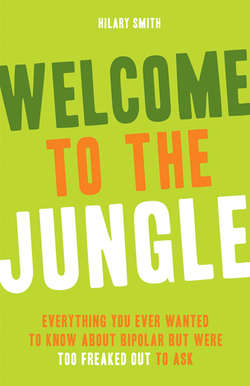Читать книгу Welcome to the Jungle - Hilary T. Smith - Страница 22
На сайте Литреса книга снята с продажи.
WHY DO I HAVE BIPOLAR?
ОглавлениеYou didn't get bipolar because you're weak, lazy, bad, or because Zeus wanted to smite you (though a meditation instructor I talked to claimed bipolar was due to bad karma from a previous life; people, don't step on ants!).
You probably got bipolar because you were genetically predisposed to it, and something triggered those particular genes to light up howling. The triggering of that genetic time bomb is called “onset.” The age of onset for bipolar disorder is generally between the late teens and late thirties, though nowadays kids and old people are getting diagnosed too.
If you're feeling guilty about developing bipolar, don't: there's really nothing you could have done to avoid getting it, short of strangling yourself in the womb. Some people who have the genetic potential never develop bipolar (just like you can have a family history of breast cancer without developing it yourself). If the sucker happens to break out, well then, you did nothing to cause it except simply be alive.
People who have bipolar always have a certain narrative about how it developed: “I'd just gotten my first job and my first girlfriend, my parents divorced, and I started going crazy.” “I was staying up late, listening to a lot of Marilyn Manson, and shit just started getting weirder and weirder.” For one thing, humans love to tell stories. It makes much more sense to place bipolar disorder in the context of certain events, rather than having it come out of nowhere. Though the environmental triggers of bipolar disorder are not well understood, one thing many accounts have in common is a period of lifestyle change, stress, or major life events (both positive and negative). Real specific, huh? Try naming a time in your teens and twenties when you're not going through a period of stress, lifestyle change, or major life events!
In other cultures, narratives of mental illness sometimes focus on spiritual matters (“he is being haunted by ghosts!”) or family relations rather than biochemistry. Our Western narrative might be scientifically accurate, but it is not necessarily the most useful or compassionate way of imagining mental illness. If “haunted by ghosts” feels more meaningful and accurate to you than “haunted by misbehaving neurotransmitters,” then please, tell your own story!
Otherwise, it's you against the mothership. Lock and load, lock and load. . . .
